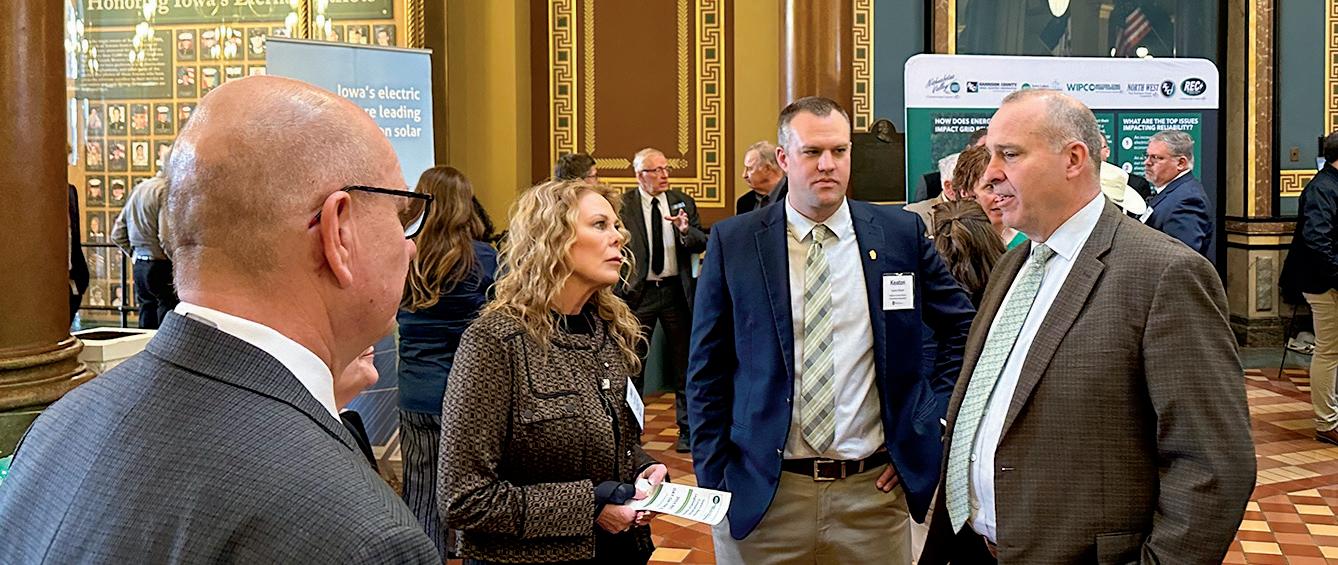

Iowa’s rural electric cooperative advocate for power reliability during the 2024 REC Day on the Hill WattsWatt
The sun was shining on more than 200 employees and elected directors from Iowa’s locally owned rural electric cooperatives (RECs) as they convened at the Iowa Capitol on March 12 to advocate for important issues during the annual “REC Day on the Hill” event.
“Our annual advocacy day at the capitol is a powerful opportunity to meet face-toface with our state legislators and share a local perspective on issues that impact rural Iowans and rural economic development,” remarked Chuck Soderberg, executive vice president and general manager for the Iowa Association of Electric Cooperatives (IAEC).
Advocates asked elected officials to ensure reliable electric service for Iowans by supporting an “all-of-the-above” electric generation strategy. Specifically, Iowa’s electric cooperatives believe it’s time to update the state’s 2001 advanced ratemaking principles (ARPs) to stipulate an all-of-theabove approach and include nuclear and energy storage technologies.
Also related to reliability, advocates talked with their legislators about Integrated Resource Plans (IRPs) and the potential pitfalls of requiring Iowa utilities to file IRPs as part of contested case proceedings before the Iowa Utilities Board. IRPs will increase administrative and legal fees which must ultimately be paid by ratepayers. In other states, IRPs have served as a pathway to the premature closure of carbon-based power generation facilities which negatively impacts electric reliability.
Additionally, co-op representatives

REC Day on the Hill
discussed the issue of “right-of-first-refusal” which allows incumbent, established utilities to have the first option to construct, maintain and operate electric transmission projects. Iowa’s electric co-ops are best prepared to respond locally to weatherrelated outages because we have a proven track record of restoring power quickly and safely.
During the advocacy event, representatives educated legislators on the benefits of the not-for-profit cooperative business model, which includes local
ownership, democratic governance and cost-based rates. Several electric cooperatives displayed booths in the rotunda which provided information on topics including economic development, digital metering advancements, investments in technology, safety innovations, energy efficiency efforts and vegetation management work.
Learn more about the legislative priorities of Iowa’s electric cooperatives and Iowa Rural Power grassroots advocacy at www. iaruralpower.org.
Employees hear updates, train and
package 20,088 meals
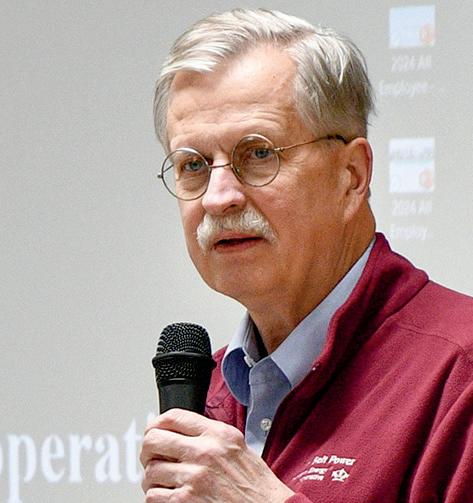
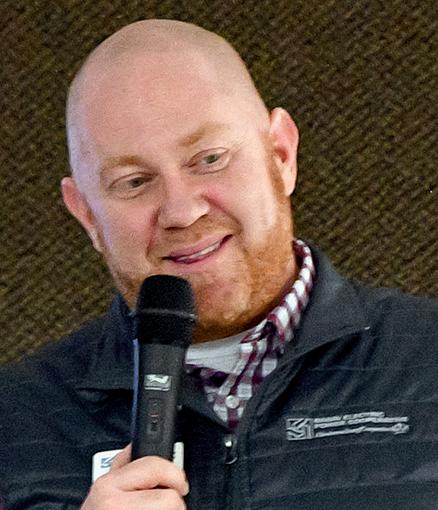
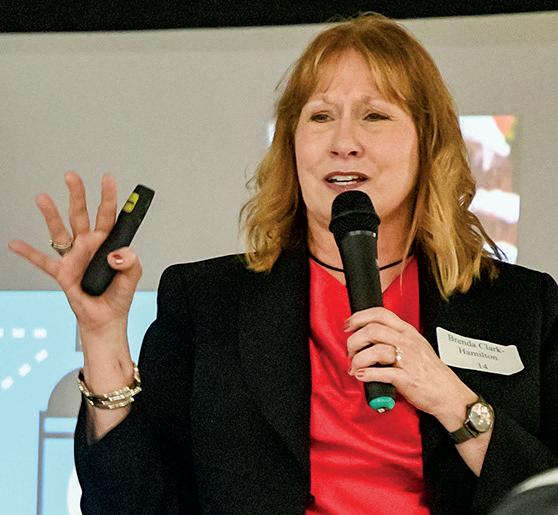
Ken Kuyper, soon-to-be retired general manager, kicked off Corn Belt Power Cooperative’s third all-employee day Feb. 29 at the Humboldt County Fairgrounds with thanks and parting advice to employees during what would be his last all-employee day.
“I know change can be unsettling, I’ve seen a lot of it in my 43 years at Corn Belt Power,” he said. “Despite all the changes, if we keep focused on our core principles of integrity, accountability, commitment, and teamwork, I know
Corn Belt Power will remain strong in service to our members-cooperatives and their members.”
Kuyper noted he was pleased with this year’s safety program.
“I also want to emphasize how important it is to do our jobs safely. I reported a few workplace related incidents and injuries to our board this past year,” he said. “That’s always a difficult conversation. I want you to know that our board fully supports our safety program and wants all of you to return home the way you came to work.”
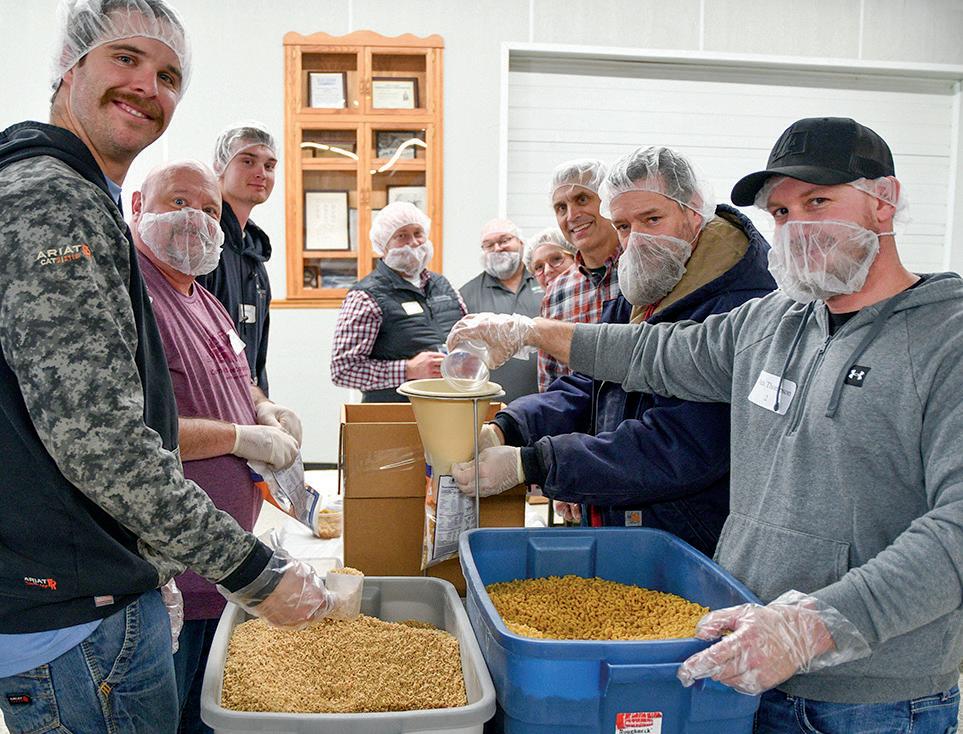
Following Kuyper’s brief remarks, Jacob Olberding, assistant general manager, thanked Ken for his years of service and noted he’s excited for the future of Corn Belt Power.
Employees heard brief updates from each of Corn Belt Power’s five departments.
Jeremy Woeste, supervisor member relations, Basin Electric Power Cooperative, provided insights into Basin Electric’s operations and future direction in power generation, enriching the event with valuable industry perspectives.
Native Iowan Brenda Clark Hamilton, gave a seminar on change in the workplace. Hamilton is a dynamic keynote speaker who offers fresh perspectives in leadership, communication, team-building, change management and offering one’s personal best to life, relationships, and career.
Following the training portion of the day, Corn Belt Power employees came together to package 20,088 taco macaroni meals in just two hours for Meals For the Heartland.
Corn Belt Power delivered the meals to the Upper Des Moines Opporunity Food Bank in Humboldt and North Iowa Community Action Organization in Mason City.
Corn Belt Power and Basin Electric together donated $6,300 monetarily in addition to the packaged meals.
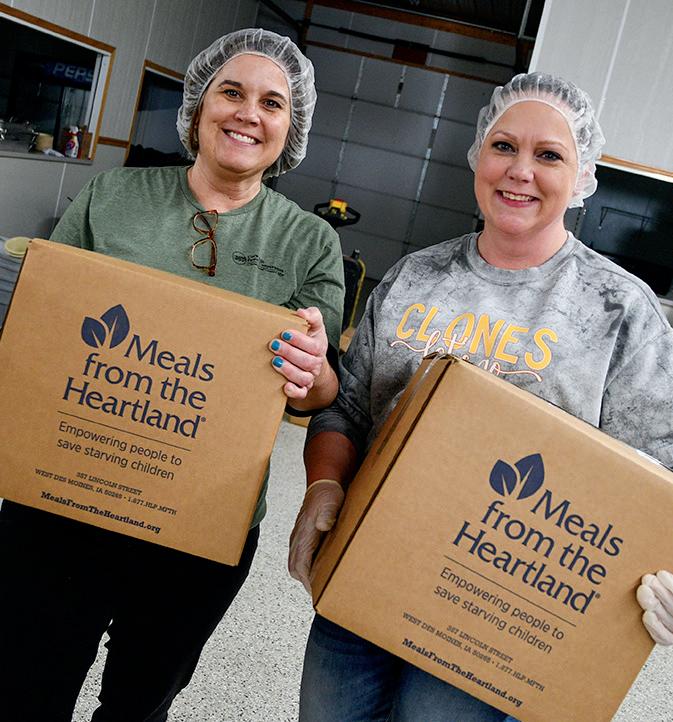
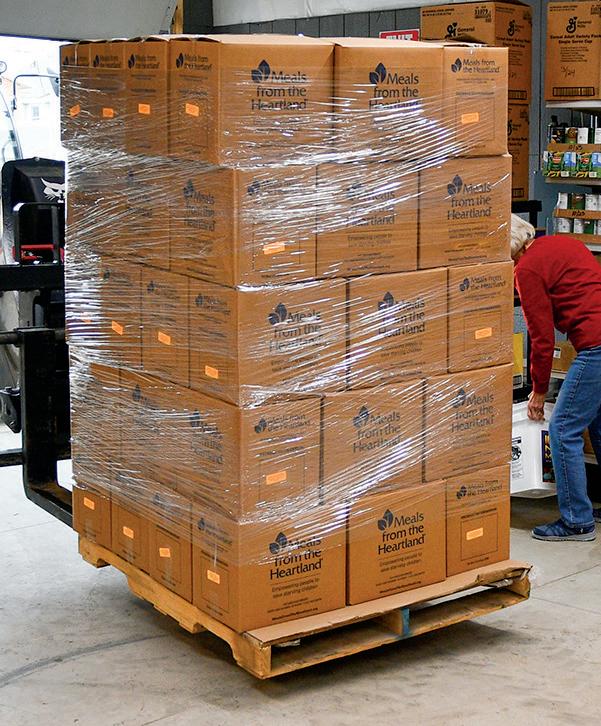 Above | 1) Ken Kuyper, executive vice president and general manager, Corn Belt Power Cooperative shares parting advice at the G&T's third all-employee day. 2) Jeremy Woeste, supervisor member relations, Basin Electric Power Cooperative, offers industry perspective on future generation. 3) Brenda Clark-Hamilton, keynote speaker, shares how she lists fives words on a post-it note that describe the type of person she wants to be and how she wants to show up in life. Hamilton recommends keeping our own list of five in a visible location as a regular reminder to self.
Above | 1) Ken Kuyper, executive vice president and general manager, Corn Belt Power Cooperative shares parting advice at the G&T's third all-employee day. 2) Jeremy Woeste, supervisor member relations, Basin Electric Power Cooperative, offers industry perspective on future generation. 3) Brenda Clark-Hamilton, keynote speaker, shares how she lists fives words on a post-it note that describe the type of person she wants to be and how she wants to show up in life. Hamilton recommends keeping our own list of five in a visible location as a regular reminder to self.

Nostrom becomes
journeyman
As of March 1, Luke Nostrom completed on-the-job-training and coursework to become a journeyman electrician. To become a journeyman, Nostrom went through the distance learning program at Northwest Lineman College. The program includes self-guided bookwork and on-the-job training.
Luke is a member of the Humboldt electrical maintenance crew. Congratulations Luke!

Wisdom gets new operator
Mitchell Peters started as a control operator at Wisdom Station Feb. 27. For the past two years, Mitchell served as a production process operator at Valero Renewable Fuels. He attended the Wind Energy and Turbine Technology program at Iowa Lakes Community College. Welcome, Mitchell!
Corn Belt Power operates first two months of 2024 without outage
They often refer to it as the “five nines of reliability,” a standard aimed at keeping the lights on 99.999% of the time.
In the initial two months of this year, Corn Belt Power celebrated an exceptional achievement: zero outages throughout its transmission system. While occasional single months have passed without incident in the past, experiencing two consecutive months without unplanned outages is a rarity.
Reflecting on this milestone, Kevin Bornhoft, vice president, engineering and system operations, Corn Belt Power, said, “I can’t recall a time when we’ve sustained back-to-back months without an unplanned outage.”
Winter months typically pose challenges for maintaining uninterrupted service due to weather-related issues, but this year proved
to be an exception. Despite facing severe weather conditions in January and high wind warnings throughout February, Corn Belt Power managed to maintain a flawless record.
Bornhoft attributes this success to the dedication and hard work of Corn Belt Power’s team, alongside the continuous improvements made to the system over time.
“I extend my gratitude to all employees, past and present, for their unwavering commitment to building and sustaining a highly reliable system,” he said.
However, as is often the case, perfection is fleeting. In early March, strong winds in the northeastern part of Corn Belt Power’s service territory caused a brief transmission outage. Then, on March 20, an unexpected visitor, a raccoon, disrupted operations when it ventured into the cooperative’s Galt substation, resulting in another short outage.
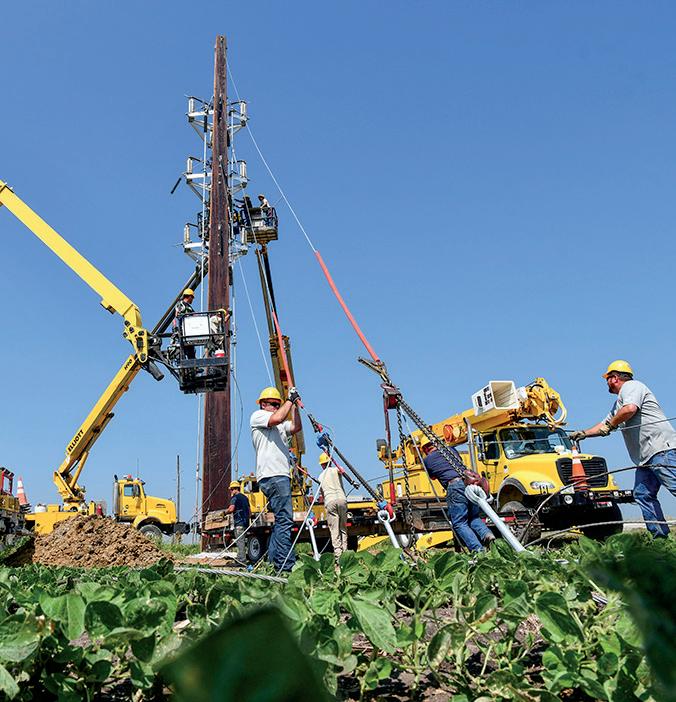 Luke Nostrom Mitchell Peters
Above | Corn Belt Power transmission crews install a new three-way switch southeast of Gilmore City in 2023 due to a transmission line rebuild project. Transmission work
Luke Nostrom Mitchell Peters
Above | Corn Belt Power transmission crews install a new three-way switch southeast of Gilmore City in 2023 due to a transmission line rebuild project. Transmission work
Jeff Lindaman, system operator, and Jacob Olberding, assistant general manager, measure taco mac ingredients to exact weight prior to sealing. Corn Belt Power employees packaged 20,088 taco mac meals in just two hours at their all-employee day Feb. 29.
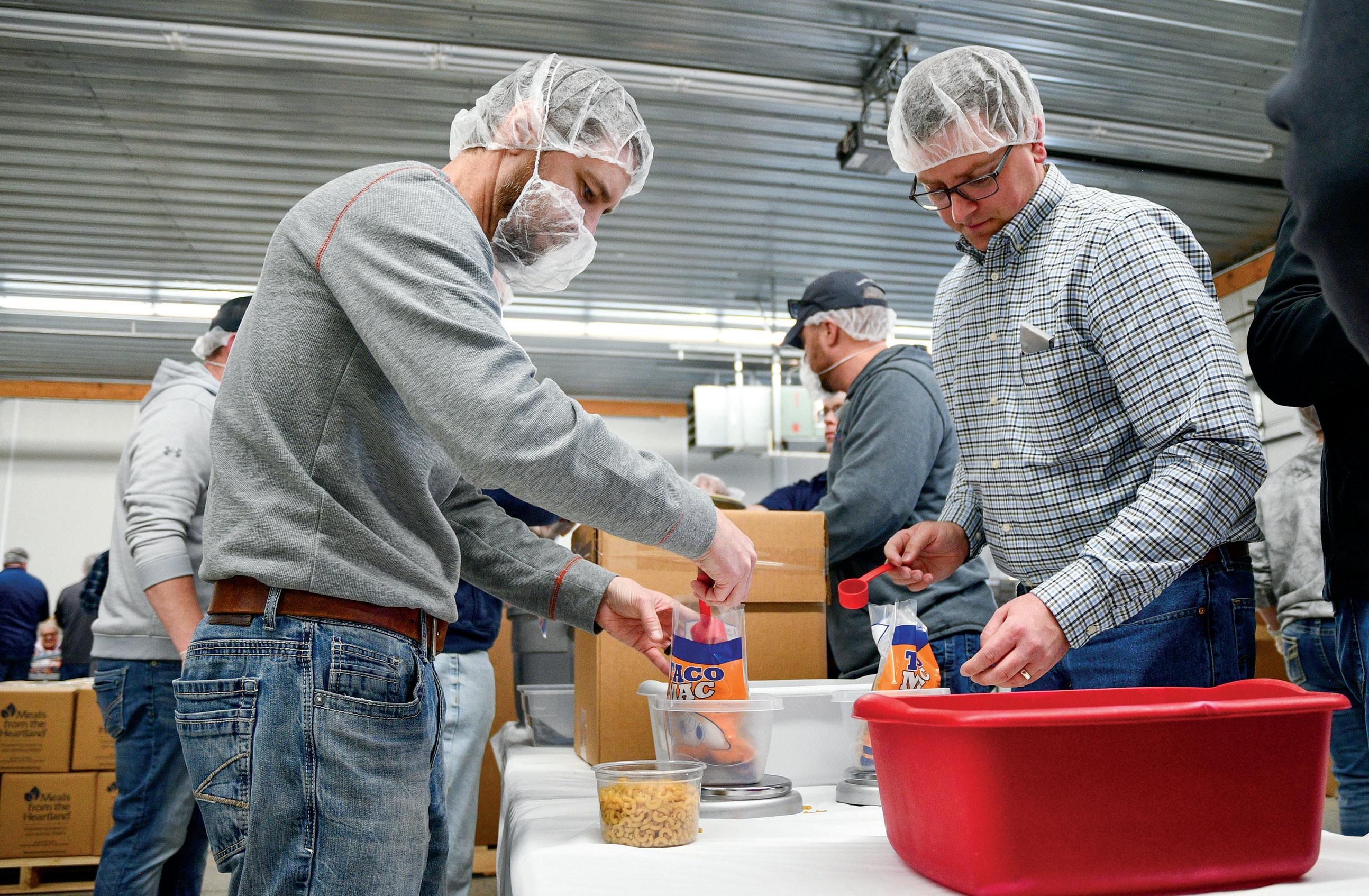
March Touchstone Energy Volunteer Challenge winner | Amy Howard, executive assistant, Iowa Lakes Electric Cooperative, donated her $100 prize to the Cherish Center in Milford.
LEAD class learns about change
Corn Belt Power’s third Leadership Exploration and Development group met for its eighth session in Fort Dodge, Feb. 15.
Guest speakers included Corn Belt Power leaders, Ken Kuyper, executive vice president and general manager, and Mike Thatcher, vice president, power supply.
LEAD members delivered individual book reports, discussed upcoming projects and learned about change.
LEAD facilitator, Kathy Peterson, PeopleWorks Inc., shared how change begins with the individual and is based on unique experiences, education and background.
“When change is announced, our natural tendency is often to move into fight-or-flight mode,” says Peterson. “It’s
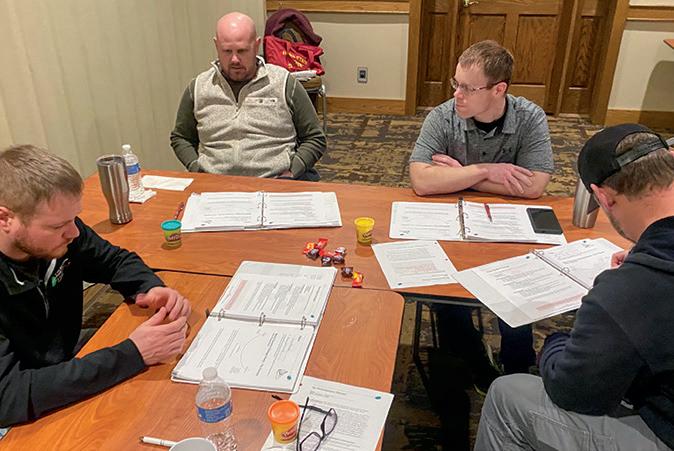
Becoming transition ready
important to lean into change, instead of allowing ourselves to immediately and instinctively lean away from it. There can be unknowns and danger in change as well as exciting opportunities.” Peterson invited LEAD members to consider making their first response to change “maybe” or “ yes ” instead of “ no ” . “We're always moving from one way of doing things to the next,” says Peterson. “We need to anticipate change. We used to think an in-home rotary dial telephone was great technology. Now, our phone, camera, news and music are with us everywhere we go. We’ll never be ‘done’ with change.”
